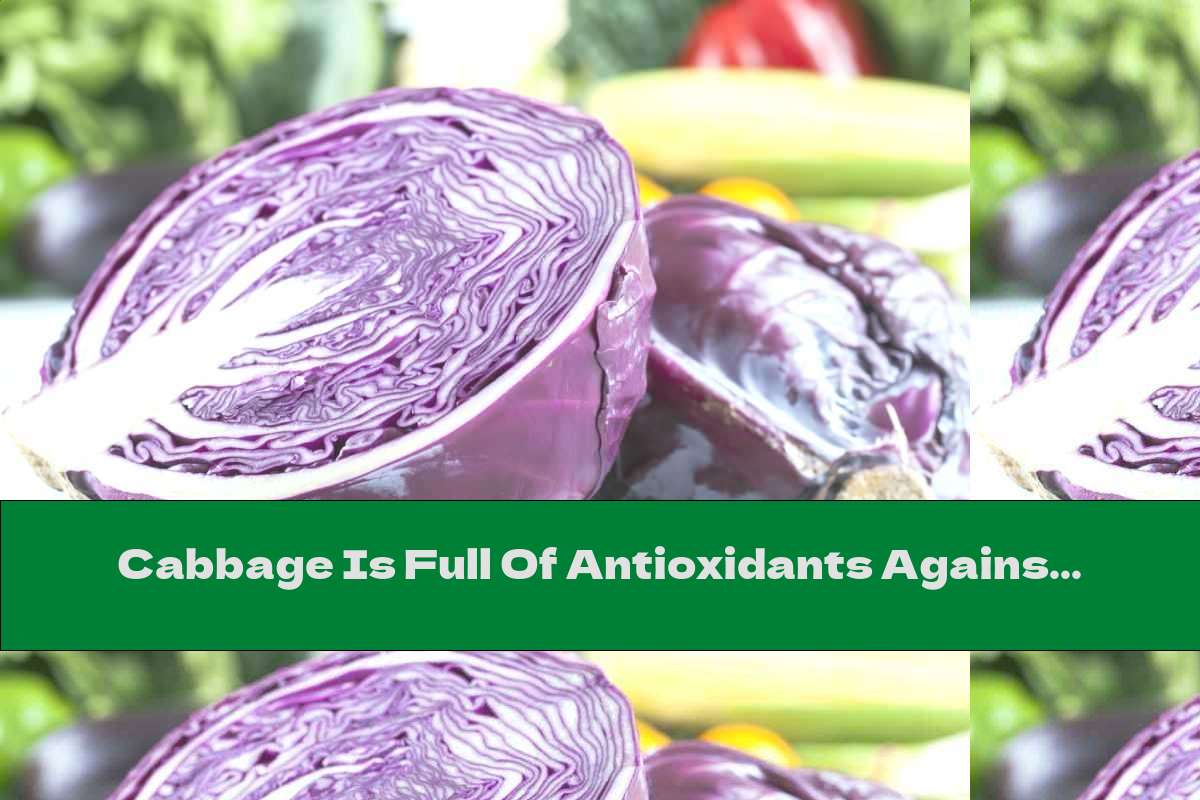Cabbage Is Full Of Antioxidants Against Cancer
 Author: Victoria Aly
Time for reading: ~2
minutes
Last Updated:
August 08, 2022
Author: Victoria Aly
Time for reading: ~2
minutes
Last Updated:
August 08, 2022

CHAPTERS (Table Of Contents)
Purple cabbage is much richer than others with antioxidants and nutrients for healthy bones, heart and intestines.
Purple cabbage , as well as white cabbage , Brussels sprouts and even cauliflower and broccoli, belong to the cruciferous vegetables. Cruciferous vegetables are popular with their high content of antioxidants and fiber.
Purple cabbage, unlike green cabbage, is much richer in elements that are good for the bones and heart. Who are they? Vitamin C - nearly 63% of daily needs, vitamin K - about 31% of daily needs, vitamin B6 - about 12% of them. Also about 6% of the daily needs of vitamin A, potassium, thiamine and riboflavin. It also contains iron, calcium, magnesium, phosphorus, copper and zinc.
Contrary to expectations, vitamin C is not the only component that helps the body recover. It is also important for bone formation. Its key role is to protect cells from damage.
In combination with vitamin K1, calcium, manganese and zinc, the benefits for bone health increase.
Its antioxidants are anthocyanins and kaemferol. They are four to five times more in quantity than in purple than in green cabbage. Anthocyanins are responsible for the specific purple color of these varieties. It contains 36 types of anthocyanins.
A study found that regular consumption of foods containing these antioxidants by women reduced their risk of heart attacks by 11-32%. These flavonoids have a beneficial effect on blood pressure, which is reflected in a reduced risk of developing cardiovascular disease.
Purple cabbage is also a good source of sulforaphane , which is characterized by its strong anti-cancer properties and benefits for heart health.
Scientists have found that its consumption has a positive effect on intestinal health. In this case, the inflammatory processes in the intestine decrease by 22 -40%. According to some, this is due to sulforaphane.
The anti-cancer effect, in addition to it, is also due to anthocyanins . Although the data are not conclusive and more research is needed, scientists believe that purple cabbage reduces the risk of colon and breast cancer. Sulforaphane and anthocyanins have been suggested to kill cancer cells and inhibit tumor growth and proliferation.
Except that the fiber its improved peristalsis of the intestines and reduce inflammation in the intestines purple cabbage helps to reduce these because of gastrointestinal mucositis , evolving often as a side effect of cancer treatment.
The insoluble fiber in cabbage is about 70%, which helps the passage of intestinal contents and prevents constipation. The remaining 30% are insoluble , which provides food for beneficial bacteria in the gut and the synthesis of short-chain fatty acids such as acetate, butyrate and propionate. They are also important in reducing inflammation and other symptoms in intestinal diseases such as Crohn's disease, irritable bowel syndrome and ulcerative colitis.
There is evidence that the consumption of nearly a liter of fresh cabbage juice improves the condition of intestinal ulcers.
Cabbage can be consumed in any way and in all cases remains good for health. Naturally, the richest in nutrients is in raw and fermented form.
How else can you use it for health?
Strange and outdated as it may sound, applying a cabbage leaf to a sore knee due to arthritis has a scientifically proven effect. However, the procedure should be performed daily for at least 4 weeks and it should still be clear that its effect cannot be better than applying an analgesic gel for the same purpose.
Its use is less popular for complaints of painful breasts in the immediate postpartum period. In addition to reducing swelling and a feeling of heaviness and burning in the breasts in women in labor, cabbage leaf compresses improve blood circulation and milk flow then.
Related Articles
- Nutritional Benefits of Champignons: Vitamins, Minerals, and Antioxidants
- The Impact of Coffee on Nutrition: Benefits, Antioxidants, and Recipes
- Nutritional Benefits of Cherrywood: A Guide to Antioxidants, Fiber, and More
- The Nutritional Benefits of Red Cabbage: A Colorful Addition to Your Plate
- Nutritional Benefits of Coconut Pulp: Fiber, Healthy Fats, Antioxidants, and More